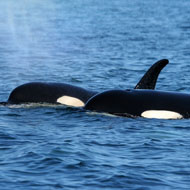
Born Free cautiously welcomes announcement
Thomas Cook has announced that it will no longer be selling tickets to animal attractions that keep orcas in captivity.
In a blog post, the travel firm said its decision takes into account feedback it had received from customers and scientific evidence provided by animal welfare specialists.
‘This was not a decision we took lightly,’ writes chief executive Peter Fankhauser. ‘We always said that we would continue to review our [animal welfare] policy, conscious that the more we got into this area, the more we would learn, and conscious also of changing customer sentiments.
‘We have actively engaged with a range of animal welfare specialists in the last 18 months, and taken account of the scientific evidence they have provided. We have also taken feedback from our customers, more than 90 per cent of whom told us that it was important that their holiday company takes animal welfare seriously. That has led us to the decision we have taken today.’
The move will see the removal of two attractions that are currently on offer to Thomas Cook customers - SeaWorld in the USA and Loro Parque in Tenerife.
Mr Fankhauser recognised that both parks had passed audit standards and made improvements to the way their animals are treated. But, he added that Thomas Cook is now working with both parks to prepare for its exit in 12 months.
The news has been cautiously welcomed by animal welfare charity Born Free. In a press release, the charity said ‘it remains to be seen whether they [Thomas Cook] or other travel agents respond to the risk of suffering endured by other cetaceans, such as dolphins and beluga kept in captivity and take appropriate action’.
Dr Chris Draper, head of animal welfare and captivity at Born Free added: “While there is a long way to go, I hope we will soon welcome an era where the global travel industry starts to work with Born Free and other welfare and conservation NGOs, to promote the protection and long-term future of cetacean in the wild where they belong.”



 The latest
The latest